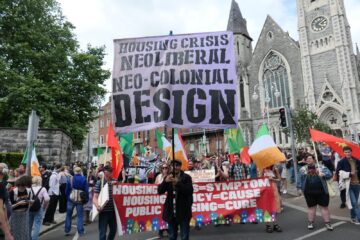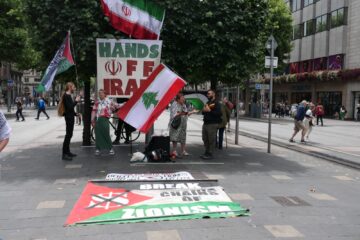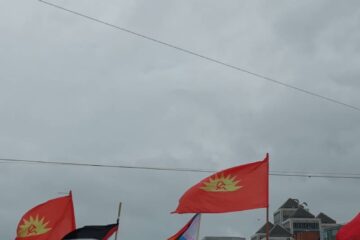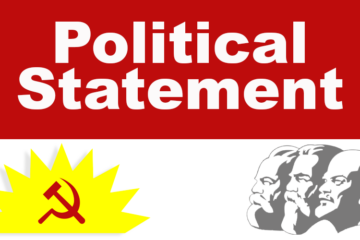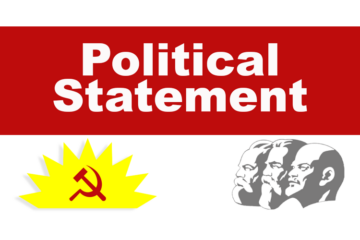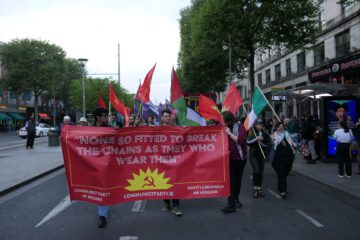Comrades, on behalf of the Communist Party of Ireland we’d like to thank you for the invitation to speak today. Our own Party is commemorating James Connolly as we speak and this is appropriate given the topic of this discussion. Notwithstanding this important event on our calendar, we still felt it was important to send someone to speak here.
Ireland and India have a long history of solidarity, born out of our peoples both enduring the tyranny of the British empire, with independence struggles that have learned much from each other. Struggle breeds solidarity. In 1932 the Indian-Irish Independence League was formed, to support freedom for our two peoples.
In many ways, we have much to learn from the struggle by comrades in India, with the 2-year struggle of Indian farmers and the recent general strike being mobilisations of tens of millions of workers. The central role of Indian Communists in these can’t be ignored.
In Ireland, it has to be admitted that the trade union movement is not as powerful. But we remain committed to building workers’ power and Indian comrades can have a role to play here.
Trade Unionism in Ireland was, at the turn of the 20th century, restricted to narrow, craft unionism, with unions based in Britain. Not until the efforts of ‘Big Jim’ Larkin and James Connolly in establishing the Irish Transport and General Workers Union (Now SIPTU) in 1909 was there a radical trade union movement that was organising the unorganised, building class-consciousness and mobilising the working-class, as seen in the 1913 Dublin Lockout.
The Lockout led to the formation of the Irish Citizen Army, which Lenin called the “first Red Army in Europe”. The ICA would go on to become a key part of the 1916 Easter Rising, and Irish labour would have its peak during the revolutionary years of 1916-1924, with general strikes, occupations of workplaces, and a particular mention of the Limerick Soviet of 1919, when the local trades council took over the city of Limerick, and workers even printed their own currency.
I won’t continue with the history of the trade union movement as I’ll be here all day. Suffice to say that this was the peak of Irish trade unionism. The counter-revolution of 1923-24 – the creation of the Irish Free State, the partition of Ireland, and the destruction of the Irish Republic – undid all the gains made by workers in this period. The CPI has always worked within the TU movement, and we warned about the effects of what was called social partnership on the organisation of the working-class.
Social Partnership refers to agreements made between government, business and unions, that lasted for over 20 years until 2011. In effect, it was an attempt to put us all together under the one umbrella. In other words, a pacification process. As we know, you can not reconcile the interests of workers with the interests of the capitalist class. Social Partnership led to the decline of the TU movement and left it toothless when the vicious austerity measures came in after the Great Recession.
In particular, the 1990 Industrial Relations Act is a weapon of the bosses. In the south, 23% of workers are on low-pay – the 2nd worst in the OECD – 30% in the north. Around 1 in 4 workers are members of TUs, the majority in the public sector. We in the trade union movement need to ask ourselves why three out of every four workers have not joined a union. Trade unions have mostly been in defensive mode for more than thirty years. This is a direct result of Thatcherite anti-union legislation in the North, the Industrial Relations Act south of the border, and social partnership.
The 1990 Industrial Relations Act :
Outlaws political or sympathy strikes, bans occupations or sit-ins, prevents workers walking out of the workplace or taking immediate industrial action. It restricts picket locations, imposes 7-day strike notices, threatens unions with fines/legal action and has created a ‘servicing’ model of trade unionism, which dulls class-consciousness and encourages individualism.
In the 1980s, workers at Dunnes Stores refused to handle good from Apartheid South African, with their eventual strike action lasting 3 years and gaining international attention. If similar action were to take place today, for example in solidarity with Palestine, it would be illegal under the 1990 Industrial Relations Act. The same goes for actions by workers in 1920, when Irish workers refused to carry munitions or transport troops for the British military. So we can say that this 1990 Act is more repressive than the legislation during the British war effort in Ireland.
James Connolly once said that “Legislation does not control the lords of industry. It is the lords of industry who control legislation.”
The CPI is involved in the effort by the Trade Union Left Forum to abolish the 1990 Act and replace it with legislation which allows the ability to organise. Several trade unions have endorsed the campaign and just at the end of last year, the Irish Congress of Trade Unions conference – representing some 800,000 workers – voted to back a campaign for legislation to return all rights lost to workers as a result of the 1990 Industrial Relations Act.
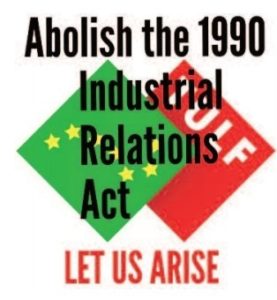
Since the campaign was endorsed by the grassroots nothing has happened to progress of it by the trade union leadership. This has led to a grassroots organisation of trade union activists, the Trade Union Left Forum stepping into the void & drafting the necessary legislation which they will launch on June the 2nd in order to build the campaign supported by the trade union membership but ignored by the TU leadership.
There is also a pressing need to organise in the north of Ireland, where unions remain tied to British-based leaderships out of touch with the realities on the ground.. Anti-TU laws in Belfast or Derry are not very far off what they are in the south. The unions have an important role to play in the ongoing struggle for Irish unity and national independence which I am sure you are following with interest. Only the working-class can deliver real freedom, economic as well as political liberation. That’s why the working-class needs organisation.
The Fair Employment (Miscellaneous Provisions) Bill (2022) will be launched by the TULF on 2 June, 6pm, in Unite the Union Hall Middle Abbey Street, Dublin. Be sure to attend. The struggle against the 1990 Act is but the next step in the struggle to build workers’ power, trade unions must be radical or they will be redundant.
Comrades, the capitalist class never ceases to use its economy power to achieve political ends. We need to do the same, first by building our economic power. Indian workers living in Ireland have much to give, and we invite you to join us in that event on the 2nd June. A union, whether in Ireland or India, is not a service you get, but a power you wield. So let’s use that power.
Beir Bua – Lal Salam




